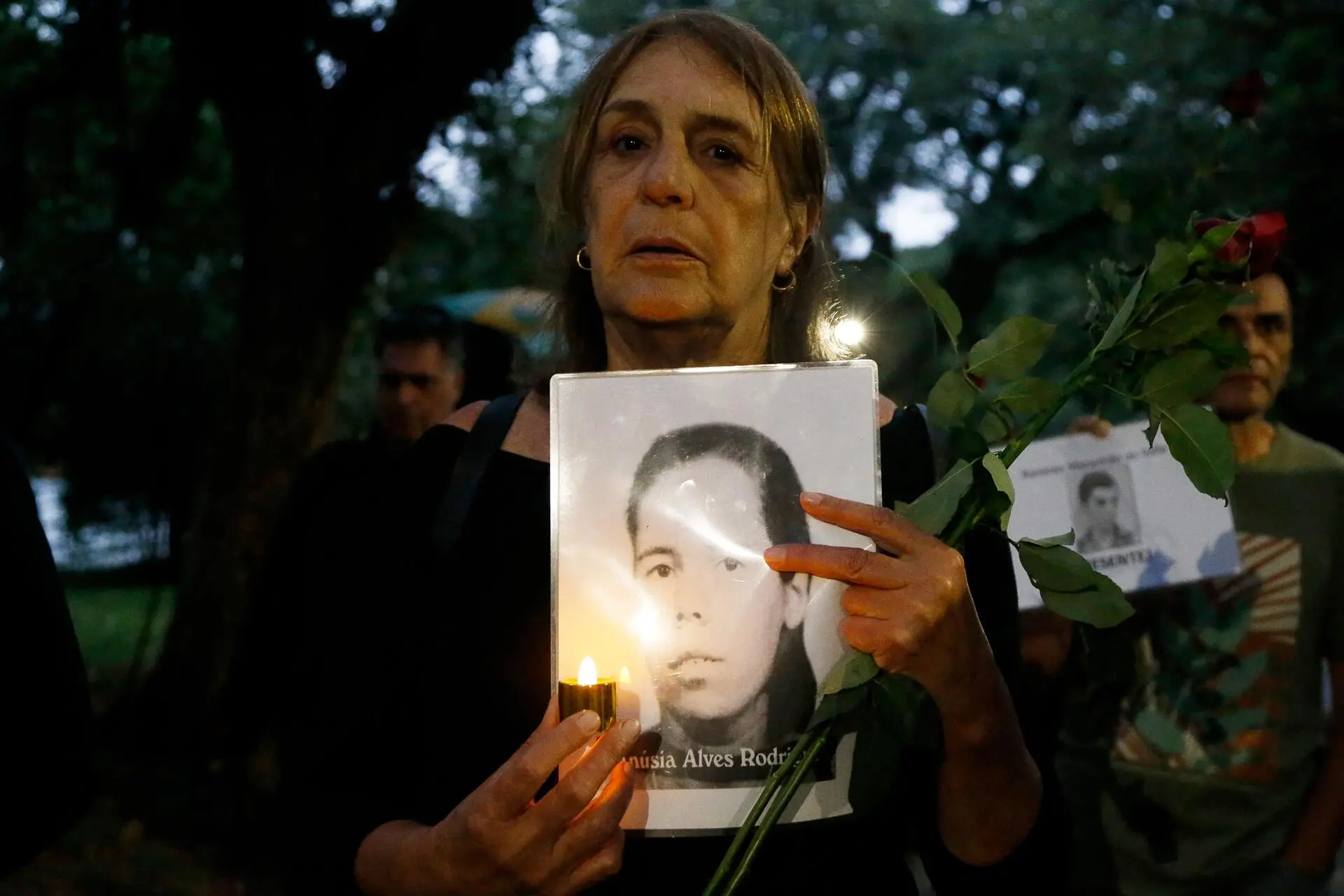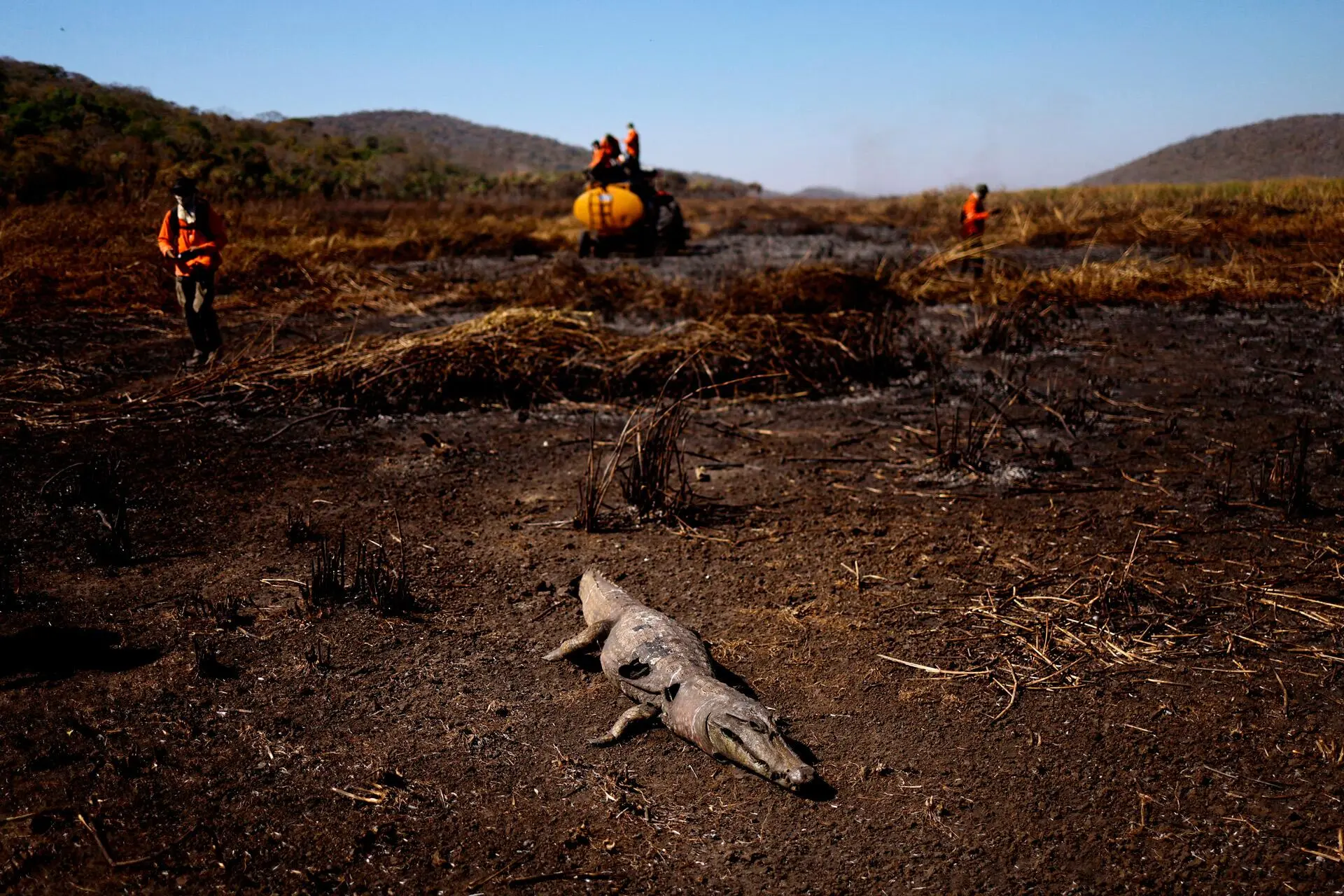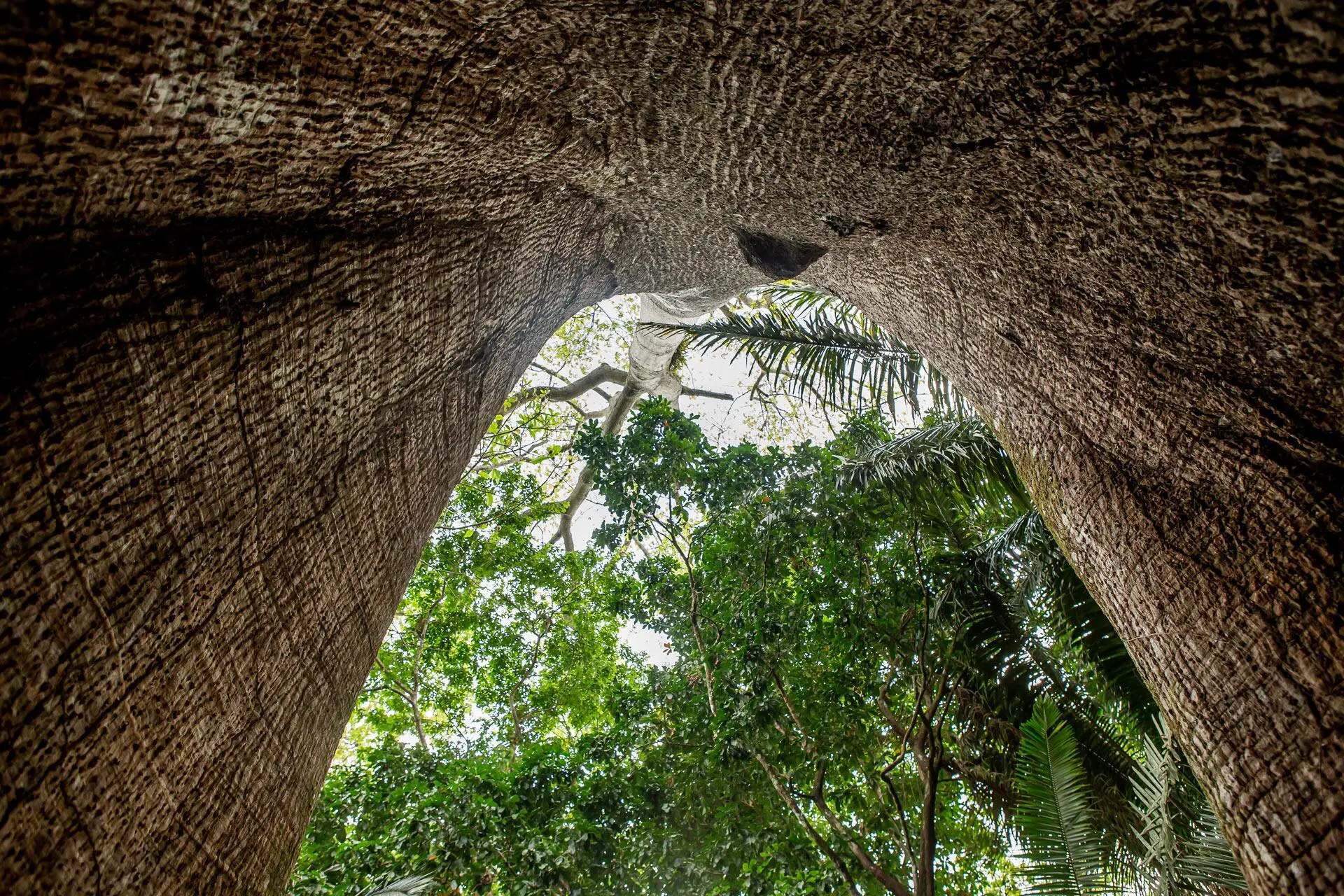There is no way to understand the destruction of the Amazon without understanding that the raping of the forest and the raping of women are both driven by the same power relationship. It is neither a coincidence nor by chance that parliamentarians who defend the criminalization of women who seek abortion care—even if their pregnancy is the result of rape—likewise defend anti-environment projects. Both attitudes are anchored in a single structure. It is the same worldview that assails women’s bodies (especially girls’) and Nature’s body. Closely entwined with capitalism and colonialism, this dominant mentality can be traced to a common root: the patriarchy.
We have to understand the determinant role of the patriarchy in our daily lives if we are to understand both the draft bill now before Congress—the “Rapist’s Bill,” which has been all over the news in recent weeks—as well as the extreme weather event that devastated part of Rio Grande do Sul, the criminal forest fires burning in the Pantanal, the deforestation of more than half of the Cerrado, and the proximity of the point of no return in the Amazon Rainforest.
Some of those who benefit from the patriarchy have managed to create a knee-jerk reaction to the term: “That’s feminist talk.” I’m a feminist—and at SUMAÚMA, we all are. But the patriarchy isn’t a matter of feminist talk. It’s what rules all of our lives, although most of us never opted for it to be that way.
The term “patriarchy” refers to a relationship where men dominate women and where all human people who don’t fit into the so-called normal boxes of race, gender, and sexual orientation are dominated as well. It is what makes women the majority of people who are raped, earn less, are beaten more, do a double day’s work, are a minority in management positions, and have more to be afraid of when they go out. The patriarchy is the name for the power relationship that means that although women are the majority of the population in Brazil, they are the minority in both houses of Congress, only one of 11 Supreme Court justices, and a much smaller proportion of cabinet ministers across all federal administrations, including this third term of office for Luiz Inácio Lula da Silva (Workers’ Party).
Affecting more than half of human people, this situation of inequality, vulnerability, and injustice is not “natural” but rather a power relationship that has endured for generations, as if it were an immutable reality. Thus presented and perpetuated, it defines our days. And our way of relating to Nature.
Let’s take two examples, separated by time but united by the same ideology, one involving General Emílio Garrastazu Médici and the other, far-rightist Jair Bolsonaro, presidents of Brazil during different historical periods who bear striking similarities.
In the early 1970s, dictator-general Médici went to Altamira, in Pará state, to commemorate the startup of work on the Trans-Amazonian highway. Marking man’s hegemony over the forest, Médici had a huge Brazil nut tree chopped down to symbolize the “conquest of this gigantic green world.” To this day, the place is known in the region as the “president’s wood,” an obviously phallic allusion. The Brazil nut tree, just like the rainforest it represented, was the “wild” body that had to be controlled, dominated, raped, and depleted by the men in uniform who, at that moment, controlled the bodies of all the inhabitants of Brazil, prevented from speaking out and making choices, lest their lives be cut short.
State agents acting in the service of the dictatorship, presided over by Médici, were torturing women as well as men, civilians who opposed the authoritarian regime. In addition to being tortured, women were often raped by civil servants who received taxpayer money to kidnap, rape, torture, and sometimes kill—women who suffered further sadism when rats and cockroaches were shoved into their vaginas or anuses, or they were locked up in cells with a live snake. In some cases, State agents also kidnapped their children. A dictatorship is precisely about controlling bodies.

Women continue the search for the bodies of their daughters, ‘disappeared’ by Brazil’s business-military dictatorship, which kidnapped, tortured, raped, and killed civilians. Photo: Miguel Schincariol/AFP
But no one makes the relationship between women’s bodies and the rainforest’s body more explicit than the far-right former president of Brazil Jair Bolsonaro (Liberal Party), currently ineligible to run for office. In July 2019, during the first year of his hate-based administration, Bolsonaro fired off the following sentence when criticizing European countries’ interest in the Amazon: “[The rainforest] is a virgin wanted by every foreign pervert.” Advancing on the Amazon has been Bolsonaro’s central power project since his campaign. During his four years in office, he did much to enable the raping of the forest and ensure impunity for the rapists, leading to an acceleration of the destruction. The notion of a wild body that has to be dominated, viewed by Bolsonaro as a supposedly untouched “virgin body,” is a founding fantasy of Brazil, a fantasy dear to colonizers. And it can only be understood through the lens of the patriarchy, which—attached to capitalism like blood and artery—predates it.
The separation made in Congress today, between the so-called “morality agenda” and the “economic agenda” is therefore a distortion produced by slicing reality up into arbitrary categories that disguise the relationships between these agendas. It disguises, for example, the fact that what we are seeing in Congress today is an advance on bodies, an offensive intended to expand control over the bodies of women and other minorities and the body of Nature. An attempt is being made to pass what has become known as the Rapist’s Bill, because it equates abortion to the crime of murder and subjects women who opt for abortion care to stiffer sentences than the men who raped them. This is just the boldest attempt to control women’s bodies, but there are many others. Some other projects are meant to dismantle environmental policy and amend articles of the Constitution that protect Indigenous peoples and their ancestral lands, today strongholds where Nature’s plural, multiple body is more protected—one such project being the obscene historic cut-off thesis, which nullifies any Indigenous claims to land not physically occupied by these peoples on October 5, 1988.
These are not two policies but one and the same—and to combat it, we must treat it as such. This is a policy against the bodies of women, of the LGBTQIAPN+ community, of Black people, of Indigenous people—and of Nature. Both the patriarchy and capitalism—as stated earlier, blood and artery—can only guarantee their own existence by controlling bodies, but they must also destroy bodies. This includes wild Nature, which must be converted into roads, railways, mines, soybean plantations, pastureland; women, these beings who bleed and “go crazy” once a month, who are “unstable” and “unreliable”; members of the LGBTQIAPN+, community, who dare subvert the “norm”; Indigenous peoples, who refuse to be assimilated by the hegemonic culture; and Black people, who join together to resist abysmal inequality.
It is Nature and all of these other beings—labeled fickle, untamable, uncontrollable—who are being attacked by the most patriarchal (conservative is something else) Congress in the republican history of Brazil. But if we reject this false separation, we can understand, for example, how market Evangelism—the leading variety in Congress—is also an agent of environmental destruction. Or, to look at an enlightening case of these interrelationships, how Chico Mendes’s confessed murderer became an Evangelical pastor and the chair of his local chapter of the Liberal Party—Bolsonaro’s—in a town called Medicilândia, built along the Trans-Amazonian highway.
It is possible to gain a better understanding of why the Lula administration and its representatives in Congress have found it so hard to take a stand against the horrific Rapist’s Bill and yet at the same time are so quick to defend the expansion of oil drilling at the mouth of the Amazon and the paving of federal highway BR-319 between Manaus and Porto Velho, two potentially lethal attacks on a rainforest approaching the point of no return, that is, when it will no longer regulate the climate in South America, already the case in parts of the forest. Believing that the administration and the Workers’ Party have failed to take a firm stance against the Rapist’s Bill—put on hold, at least temporarily, after people, and especially women, mobilized in the streets and on social media—because the administration lacks a congressional majority and therefore must make trade-offs to win approval of its economic agenda is a superficial way of understanding something much more complex. Let’s start by asking this question: when a government feels it has to hand something over to gain something it considers more important, it is imperative for us to examine whatever is deemed more important and whatever is deemed barterable—and then embark on the thorny journey of why’s. It’s also worth remembering that the history of part of the Brazilian left, especially the branches rooted in communism and the union movement, have skeletons in the closet when it comes to women.
The moment when Brazil experienced its most destructive extreme weather event, in Rio Grande do Sul, was a moment when Nature was suffering a major offensive. Today, the Pantanal and Cerrado biomes are ablaze while forest fires in the Amazon are up 85% over last year—yet the dry season has hardly begun. What we are witnessing is an offensive against bodies, so vicious it has gone beyond our species’ own limits of survival.
In 2023, the year in which the number and intensity of extreme weather events led scientists to declare that humanity was entering “uncharted territory,” Brazil saw a devastating number of rapes, greater than the three previous years—and 87.14% of the victims were women. It is important to remember that most people who are raped are children and adolescents.
The 2024 Public Security Map contains some tell-tale data: the North region of Brazil, where most of the Amazon forest lies, reported the highest rape rate: 62.37 cases per 100,000 inhabitants, with a total of 10,825 victims. The already devastating Brazilian average is 39.77 cases per 100,000. In absolute numbers, Pará, champion in deforestation and criminal fires, was the state where the greatest number of women were raped: 5,592, more than half of the total for the North.
There is a vast world of relationships that needs to be explored, without the smokescreen of little boxes separating the economy from “morality,” development from environment, Nature from culture. The threat to our shared home—whether we call the threat the climate collapse, climate crisis, climate emergency, or even climate change—and the mass extinction of species through the annihilation of the biodiversity that interweaves this shared home are consequences of longstanding power relations in the human world, relations now more active than ever, unleashing brutal offensives against rebellious bodies.
The quality of our future will be determined by our ability to radically change the power relations that assail bodies, now with even more force than at other times in human history. To do this, we must smash these little boxes and immerse ourselves in the inter-relational, interconnected, entwined, and mutually, infinitely contaminated world of Nature-culture—this world that so frightens those who control and destroy bodies.

From January 1 to June 25, the Pantanal registered 3,372 fires, 22 times more than in the same period last year. Photo: Ueslei Marcelino/Reuters
SUMAÚMA takes part in the resistance against the destruction of bodies by doing journalism from the Amazon Rainforest and adopting an approach that understands the climate crisis and extinction of biodiversity as topics that intersect with the markers of race, gender, class, and species. In this issue, we bring our community of readers two stories on a complex, heavy, yet highly relevant subject: carbon credits on the voluntary market, the one that isn’t regulated by any government—heralded as a new “gold rush” in the Amazon. At present, Indigenous villages, Quilombola territories, and extractivist reserves are under constant assault by foreign and Brazilian companies looking to sign projects with the Indigenous and traditional communities who live in still-conserved spaces of the forest. If there are some well-meaning people who think the carbon market can help stop deforestation, there is ample evidence that some individuals and firms are taking advantage of Brazil’s legal vacuum to flirt with crime.
A year ago, SUMAÚMA’s special reporter Claudia Antunes published an article that remains very current, in which she provides an in-depth explanation of what is at stake, so our readers can better understand this strategic matter and take a stand. In this newsletter, Claudia returns to the subject to reveal the activities of Mr. Greene, a U.S. entrepreneur who claims on his LinkedIn page that he uses his “vast knowledge” as a carbon credit project consultant in the “rough and tumble Amazon.” Yes, “rough and tumble” are Mr. Greene’s exact words.
Claudia’s report was part of an alliance of 13 journalism platforms that are investigating the workings of the carbon market. Led by the Latin American Center for Investigative Journalism (Clip), the series is entitled Opaque Carbon. In Brazil, Sumaúma is joined in the alliance by Agência Pública, InfoAmazonia, and Mongabay Brasil. The other members are Rutas del Conflicto and Mutante, in Colombia; La Barra Espaciadora, in Ecuador; Prensa Comunitaria, in Guatemala; Contracorriente, in Honduras; El Surtidor, in Paraguay; La Mula, in Peru; and Mongabay Latam.
SUMAÚMA believes in network journalism. In less than two years, we have formed partnerships with several platforms in Brazil and the rest of Latin America, building solid relationships with the best organizations in independent journalism. We have also partnered with two prominent universities, King’s College London, for the Unsustainable series, and New York University, for the More-than-human series. Along with the report that is part of the Clip-led alliance, this issue features an investigation by the Brazilian platform O Joio e O Trigo on abusive carbon projects, whose lead players are a British businessman, a cattle rancher from Pará, and a former officer with the São Paulo military police.
Much more than displaying an often-hyped competition between species and between individuals from the same species, what the rainforest teaches us is that life is an intense collaborative process. SUMAÚMA seeks to reproduce this knowledge by doing community journalism, because it isn’t enough to defend what we believe in—we need to be what we believe in.
Fact-checker: Plínio Lopes
Proofreader (Portuguese): Valquíria Della Pozza
Spanish translation: Meritxell Almarza
English translation: Diane Whitty
Photo Editor: Lela Beltrão
Editorial workflow: Viviane Zandonadi
Editor-in-chief: Talita Bedinelli
Editorial director: Eliane Brum

A living being for hundreds of years, this kapok tree—or sumaúma—began slowly dying after the Belo Monte hydroplant dammed up the Xingu to form a reservoir. Photo: Lela Beltrão/SUMAÚMA





